Function Keys Not Working Overview
Function keys play a pivotal role in enhancing productivity. They come to the rescue when tasks such as refreshing a webpage, printing documents, adjusting media settings such as volume and brightness control, taking screenshots, and more demand immediate attention. However, when these versatile keys malfunction, it can wrench your workflow.
These keys act up for various reasons, including dirt accumulation beneath the keys or driver-related issues. Fortunately, addressing these problems usually involves simple solutions, such as routine cleaning and configuring keyboard settings and drivers. You can also use these quick methods to fix Windows keys not working. In this article, we'll delve into the issue of Function keys not working and present six tried-and-tested methods to help you restore their functionality. Boost your productivity by learning to troubleshoot and fix these vital keys, ensuring your keyboard operates smoothly for all your tasks!
| Workable Solutions | Step-by-step Troubleshooting |
|---|---|
| 1. Run Hardware and Devices Troubleshooter in CMD | Access the Start menu and search for "Command Prompt". Choose the "Best match"...Full steps |
| 2. Update or Reinstall Keyboard Drivers | Right-click the Start button and choose "Device Manager". Expand the keyboard to see installed drivers...Full steps |
| 3. Run Windows Keyboard Troubleshooter | Press the Windows Key and the "I" key simultaneously. It will open the Windows Settings...Full steps |
| 4. Adjust BIOS Settings to Resolve the Problem | Click Start, then select the gear icon for Settings. Scroll down in Settings and click "Update...Full steps |
| More Solutions | Click Start and access settings. After that, select "Update & Security". Then, go to Update...Full steps |
Reasons Why Function Keys Not Working on Windows
Keyboard keys can experience deterioration and malfunction over time due to extended use. However, there are specific factors contributing to the non-functionality of keys like the function keys:
| Dirt and Debris Buildup | Accumulated dirt and debris underneath function keys can hinder their proper functioning. |
| Keyboard Driver Issues | Problems with the keyboard driver can lead to specific keys, including function keys, not working correctly. |
| Disabled Priority Mode | When the priority mode for function keys is disabled, it can result in their non-operation. |
| Glitches | Operating system glitches can disrupt the normal functioning of function keys, causing them to become unresponsive. |
If you're still experiencing this problem, we've prepared a short video guide with step-by-step instructions for enabling or disabling function keys in Windows 11/10.
- 00:00 Intro
- 00:19 Open Keyboard
- 00:26 Enable Fn Keys
Fix 1. Run Hardware and Devices Troubleshooter in CMD
In earlier Windows versions, users could conveniently access the Hardware and Device troubleshooter through the Control Panel. Accessing this option has been shifted in newer versions like Windows 10 and 11, requiring you to utilize the command line for access instead. Check the steps below.
Step 1. Access the Start menu and search for "Command Prompt". Choose the "Best match".
Step 2. In the Command Prompt window, type the command: msdt.exe -id DeviceDiagnostic.
Step 3. Press Enter. This action will trigger the Hardware and Devices troubleshooter.
Step 4. After the troubleshooter window appears, simply press the "Next" button to begin the troubleshooting procedure.
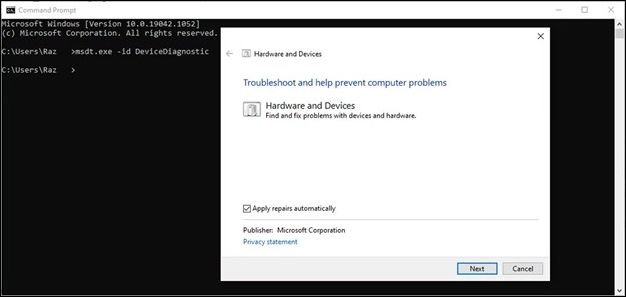
Help us disseminate knowledge! Share this page on your preferred social media platforms and empower others with valuable information.
Fix 2. Update or Reinstall Keyboard Drivers
To address issues with non-functioning function keys, ensure your keyboard's software is up to date. It is crucial, especially for keyboards with unique features that demand specific Windows-compatible software. Here's what you can do:
Step 1. Right-click the Start button and choose "Device Manager".
Step 2. Expand the keyboard to see installed drivers.
Step 3. Then, right-click to select "Update Driver".
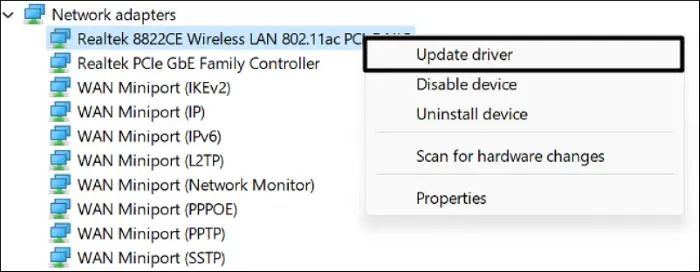
Step 4. A new window will appear. Choose "Search automatically for updated driver software" and click the "Start" button to initiate the driver update process.
You can read the following passage to learn more about the update driver in Windows:
How to Update USB Drivers on Windows 11 [2023 Guide]
Are you wondering how to update drivers on Windows 11? This article will guide you on how to use and fix your drivers. Read more >>
Fix 3. Run Windows Keyboard Troubleshooter
You can utilize the built-in hardware issue troubleshooter in the Windows operating system to help resolve these issues. The following instructions can guide you in using this troubleshooter effectively to resolve problems related to your keyboard.
Step 1. Press the Windows Key and the "I" key simultaneously. It will open the Windows Settings.
Step 2. In the Windows Settings window, navigate to the "System" category.
Step 3. Within the "System" category, select "Troubleshoot" from the list of options.
Step 4. Below Other Troubleshooters, scroll down to access the Keyboard section.
Step 5. Click "Run the Troubleshooter" in the Keyboard section to initiate troubleshooting for keyboard issues, including function keys.
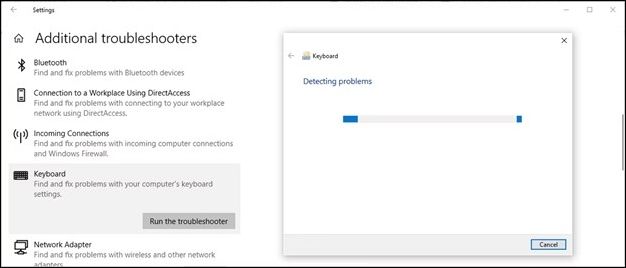
There are many troubleshooters in Windows, and if you encounter the Windows update not working, you can apply Windows Update Troubleshooter.
Fix 4. Adjust BIOS Settings to Resolve the Problem
Adjusting BIOS (Basic Input/Output System) settings can be crucial in resolving issues when function keys are not working correctly on your computer. The BIOS is responsible for managing hardware configurations, and sometimes, incorrect BIOS settings can lead to conflicts or issues with specific hardware components like function keys. To potentially fix function key issues via BIOS settings:
Step 1. Click Start, then select the gear icon for Settings.
Step 2. Scroll down in Settings and click "Update & Security".
Step 3. Choose "Recovery" from the left sidebar options.
Step 4. Beneath the "Advanced Setup" heading, you'll find an option that says "Restart now." Click on this option when you're prepared to proceed.
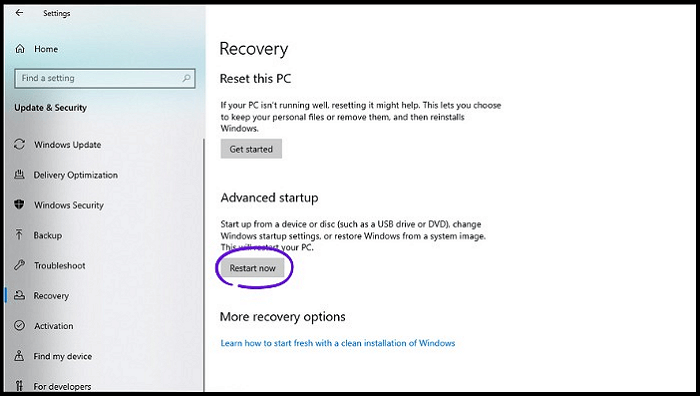
Step 5. Your computer should load a blue screen presenting advanced troubleshooting choices as it restarts.
Step 6. To access UEFI Firmware Settings, go to Troubleshoot > Advanced Options > UEFI Firmware Settings, then click "Restart" to proceed.
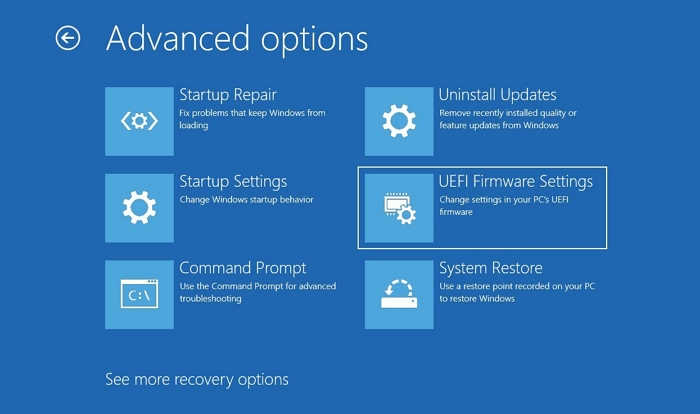
Furthermore, share this information on social media to help others discover valuable insights.
Fix 5. Update Windows Operating System
Updating the Windows Operating System can also resolve the problem of function keys not working. It is essential to ensure your computer runs smoothly, stays secure, and benefits from the latest features and improvements. Regular updates patch vulnerabilities, enhance performance, and offer new functionalities. Check out the steps below to update your Windows OS:
Step 1. Click Start and access settings. After that, select "Update & Security".
Step 2. Then, go to Update & Security and select Windows Update.
Step 3. Select "Check for Updates" and download if there are any pending ones.
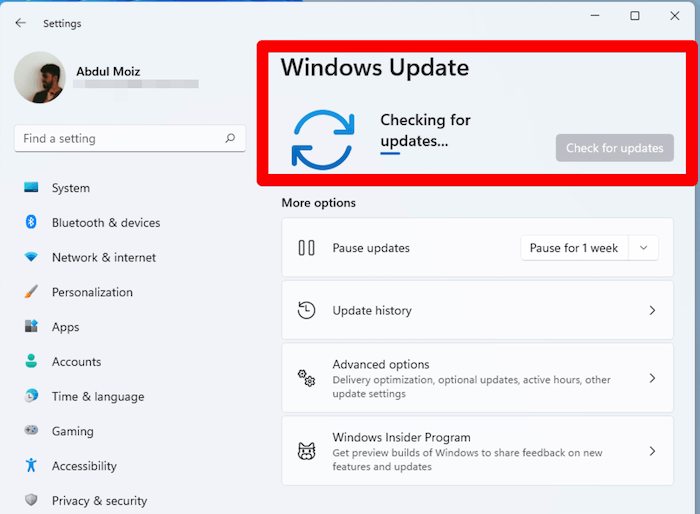
Step 4. Install the updates; your computer may restart.
Step 5. Restart if needed to complete the installation.
Moreover, it's important to note that data loss can sometimes occur during this process. However, you can ease your worries using a reliable data recovery tool like EaseUS Data Recovery Wizard Pro. It is a versatile software engineered to assist users in recovering files after Windows update. Its dependable and robust recovery features make it the preferred solution for many data loss scenarios. Whether you accidentally deleted important files, formatted a drive, faced partition loss, encountered a system crash, suffered a virus attack, or any other data loss scenario, EaseUS Data Recovery Wizard Pro has covered you.
Fix 6. Reset Windows to Factory Settings
Resetting Windows to its factory settings can be a powerful solution for resolving various issues, including problems with malfunctioning function keys. When you perform a factory reset, your operating system reverts to its original state, eliminating software conflicts or corruption and causing issues like non-responsive function keys. This process effectively wipes the slate clean, providing a fresh start for your system. Once completed, your computer will often run more smoothly, and the function keys should regain their proper functionality. Check the steps below:
Step 1. Go to the Windows Search bar and type reset. After that, select "Reset this PC" from the results.
Step 2. Click "Get started" to begin the process.
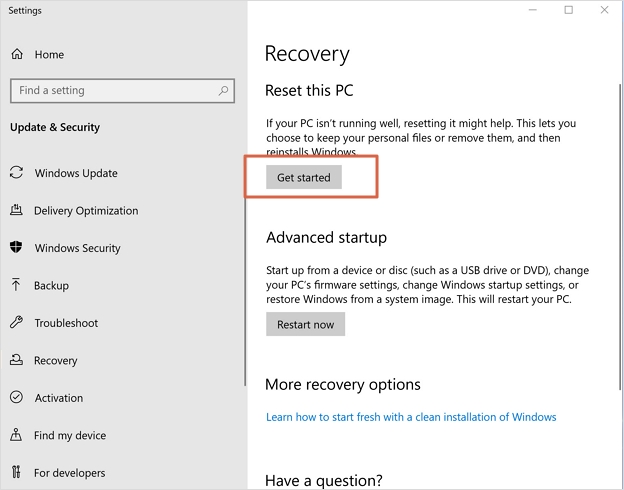
Step 3. You'll be given the option to keep or discard your files. Make your choice and proceed to start the restoration procedure.
Step 4. After the reset, your system will be refreshed, and you should have no trouble finding the Microsoft Store and other essential applications.
You can use EaseUS Data Recovery Wizard Pro to recover files after factory resetting without backup. Please share this page on your preferred social media to help others discover valuable information!
Conclusion
In conclusion, when encountering the problem of Function keys not working, users can employ various troubleshooting methods to resolve the issue. By carefully examining and applying the abovementioned solutions, users can regain control over these essential keys, ensuring a smoother and more efficient computing experience.
Remember that the specific solution may vary depending on the root cause, so patience and persistence may be required to address the problem successfully. Moreover, in the face of unexpected data loss scenarios, having a reliable and powerful tool like EaseUS Data Recovery Wizard Pro at your disposal is crucial. Download it today and ensure your important files are never lost again!
Function Keys Not Working FAQs
We have answered some common queries of people below.
1. How do you lock and unlock the Fn key?
To lock or unlock the Fn key on Windows, check if your laptop has a dedicated key labeled Fn Lock or FnLk. Pressing this key will toggle the Fn key's behavior.
2. Why are my F1-F12 keys not working?
F1-F12 keys may not work if your laptop has the Fn key enabled by default. Press the Fn and the desired F1-F12 keys to use their primary functions. Check if you can disable the default Fn key behavior in your laptop's settings.
3. How do you disable the Fn key without BIOS?
You can disable the Fn key without accessing the BIOS using third-party software or keyboard customization tools provided by your laptop's manufacturer. Look for software that allows you to remap or customize key functions.
4. How do I fix Function keys not working on Mac?
If your Mac's Function keys are unresponsive, navigate to System Preferences > Keyboard. In the Keyboard settings, you can activate "Use F1, F2, etc. keys as their default functions" to exclusively utilize these keys for their primary functions without any additional features.
Was This Page Helpful?
Dany is an editor of EaseUS who lives and works in Chengdu, China. She focuses on writing articles about data recovery on Mac devices and PCs. She is devoted to improving her writing skills and enriching her professional knowledge. Dany also enjoys reading detective novels in her spare time.
Related Articles
-
2 Ways to Force Update Windows 10 to the Latest Build
![author icon]() Brithny/2025-12-12
Brithny/2025-12-12 -
How to Fix Asus Laptop Black Screen with 11 Efficient Ways
![author icon]() Cici/2025-07-07
Cici/2025-07-07 -
Fixed: Windows 10 Reset Stuck or Windows 10 Fails to Reset
![author icon]() Tracy King/2025-07-04
Tracy King/2025-07-04 -
How to Fix Black Line on MacBook Screen [5 Methods]
![author icon]() Brithny/2025-09-17
Brithny/2025-09-17
EaseUS Data Recovery Services
EaseUS data recovery experts have uneaqualed expertise to repair disks/systems and salvage data from all devices like RAID, HDD, SSD, USB, etc.
